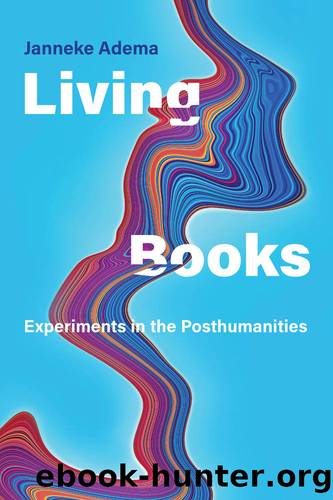Living Books by Adema Janneke;

Author:Adema, Janneke;
Language: eng
Format: epub
Tags: scholarly books; posthumanities; future of the book; experimental publishing; book history; digital books; radical open access; new materialism; digital humanities; critical praxis; scholarly poethics; remix; performative publications; distributed authorship; versioning.
Publisher: MIT Press
The Discursive Formation of the Book as a Knowledge Object
With the coming of print (or even earlier, with the coming of writing), one can claim that the book turned into an object, a standardized product that can be duplicated over and over again to securely communicate and preserve thoughts. Even more, it can be argued that with the coming of the printing press, and especially with the advent of industrial mechanization and printing processes in the nineteenth century, the book turned into a mass-market commodity. Due to declining production costs, the book could be produced and sold to an ever-growing audience of potential consumers. New forms of material production thus accompanied this book-object, part of which became the blossoming (early) capitalist enterprise of the international book trade.
Similarly, and simultaneously, a system of scholarly communication and publishing arose as part of these new forms of print communication in Europe, with specific roles and power structures. It was a system that from the beginning was integrally connected with, and almost indistinguishable from, the developments and interests of the commercial book trade. This system for the production, distribution, and consumption of scholarly research (which can be seen as continuously in progress) consisted of practices and tactics of standardization, attribution, reviewing, selection, and quality establishment, as well as trust and reputation building.5 Eventually this developed into what we presently perceive as the âmodernâ system of formal scholarly communication.6 This gradually developing system can be said to have been partly responsible for turning the book, both materially and conceptually, into a knowledge object playing specific roles and functions within the scholarly communication and publishing systems and influencing future scholarly journal and book forms.
An analysis of the book historical discourse will help explain how this development in which publications turned into integral, trustworthy, authorized documents, unlikely to change, has been narrated and how, in a related manner, a set of functions and roles developed involving academics, publishers, and librarians, among others, all with a great stake in the system of securing the book as a stable and solid knowledge object and a commodity. At the same time, the specific materiality of the printed book is seen to have helped shape our scholarly communication system; some have even said that âhistorically, the school and the university have been the institutional expressions of the bookâ7
This chapter looks at some of the particular position-takings that were formulated within the book historical discourse in relation to the commodification of the book within publishing and academia.8 It outlines how these specific position-takings can actually be seen to have contributed to the emergence of the idea of the book as object and commodity. At the same time, it examines how an intervening in and a reframing of this discourse at certain specific points could potentially start to disturb simplified notions of the book as object and the binaries that have structured its discursive formation.
To provide an example, in battling the increasing commercialization of scholarship and publishing, it will not do much good
Download
This site does not store any files on its server. We only index and link to content provided by other sites. Please contact the content providers to delete copyright contents if any and email us, we'll remove relevant links or contents immediately.
| Authorship | Bibliographies & Indexes |
| Book Industry |
Autoboyography by Christina Lauren(4687)
Asking the Right Questions: A Guide to Critical Thinking by M. Neil Browne & Stuart M. Keeley(4608)
Dialogue by Robert McKee(3596)
Eat That Frog! by Brian Tracy(3530)
Sticky Fingers by Joe Hagan(3459)
Journeys Out of the Body by Robert Monroe(3000)
Elements of Style 2017 by Richard De A'Morelli(2948)
Annapurna by Maurice Herzog(2853)
Schaum's Quick Guide to Writing Great Short Stories by Margaret Lucke(2813)
Full Circle by Michael Palin(2786)
The Diviners by Libba Bray(2450)
The Art of Dramatic Writing: Its Basis in the Creative Interpretation of Human Motives by Egri Lajos(2420)
The Mental Game of Writing: How to Overcome Obstacles, Stay Creative and Productive, and Free Your Mind for Success by James Scott Bell(2401)
Why I Write by George Orwell(2369)
Atlas Obscura by Joshua Foer(2355)
In Patagonia by Bruce Chatwin(2280)
The Fight by Norman Mailer(2164)
The Elements of Style by William Strunk and E. B. White(2079)
Venice by Jan Morris(2058)
